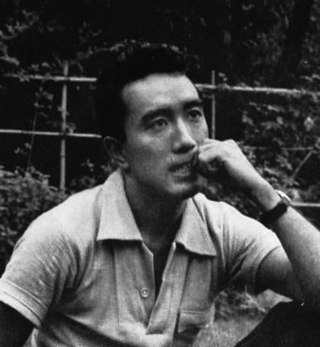
Kimitake Hiraoka, also known as Yukio Mishima, was a Japanese author, poet, playwright, actor, model, Shintoist, nationalist, and founder of the Tatenokai. Mishima is considered one of the most important writers of the 20th century. He was considered for the Nobel Prize in Literature in 1968, but the award went to his countryman and benefactor Yasunari Kawabata. His works include the novels Confessions of a Mask and The Temple of the Golden Pavilion, and the autobiographical essay Sun and Steel. Mishima's work is characterized by "its luxurious vocabulary and decadent metaphors, its fusion of traditional Japanese and modern Western literary styles, and its obsessive assertions of the unity of beauty, eroticism and death", according to author Andrew Rankin.
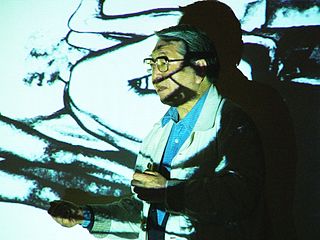
Eikoh Hosoe is a Japanese photographer and filmmaker who emerged in the experimental arts movement of post-World War II Japan. Hosoe is best known for his dark, high contrast, black and white photographs of human bodies. His images are often psychologically charged, exploring subjects such as death, erotic obsession, and irrationality. Some of his photographs reference religion, philosophy and mythology, while others are nearly abstract, such as Man and Woman # 24, from 1960. He was professionally and personally affiliated with the writer Yukio Mishima and experimental artists of the 1960s such as the dancer Tatsumi Hijikata, though his work extends to a diversity of subjects. His photography is not only notable for its artistic influence but for its wider contribution to the reputations of his subjects.

Mishima: A Life in Four Chapters is a 1985 biographical drama film based on the life and work of Japanese writer Yukio Mishima, directed by Paul Schrader from a screenplay by his brother Leonard and Leonard's wife Chieko Schrader from a story by Paul Schrader and Jun Shiragi. The film interweaves episodes from Mishima's life with dramatizations of segments from his books The Temple of the Golden Pavilion, Kyoko's House, and Runaway Horses. Francis Ford Coppola and George Lucas were executive producers of the film, which has a musical score composed by Philip Glass and production design by Eiko Ishioka.
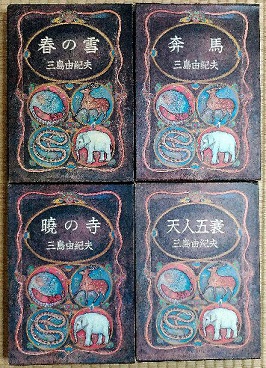
The Sea of Fertility is a tetralogy of novels written by the Japanese author Yukio Mishima. The four novels are Spring Snow (1969), Runaway Horses (1969), The Temple of Dawn (1970), and The Decay of the Angel (1971). The series, which Mishima began writing in 1964 and which was his final work, is usually thought of as his masterpiece. Its title refers to the Mare Fecunditatis, a lunar mare. The first English translated editions by Alfred A. Knopf and the Charles E. Tuttle Company featured cover designs by the graphic artist Joseph del Gaudio.
Ivan Ira Esme Morris was an English writer, translator and editor in the field of Japanese studies.
Death in Midsummer and Other Stories is a 1966 collection of English translations of stories by Japanese writer Yukio Mishima. The book takes its name from the included short story of the same title.
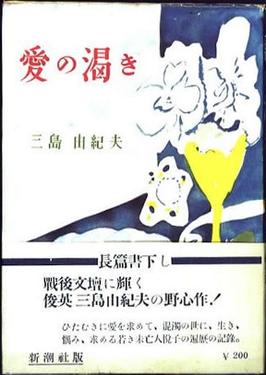
Thirst for Love is a 1950 novel by the Japanese writer Yukio Mishima. The word "kawaki" literally means thirst, but has a sense of parched dryness associated with it.

Acts of Worship is a 1965 short story collection by the Japanese writer Yukio Mishima. The title story is the tale of a Professor's visit to three Kumano shrines, accompanied by his shy and submissive middle-aged housekeeper, and his reasons for doing so. The collection was translated into English by John Bester, whose work was praised for rendering "Mishima's complex Japanese into fluent and faithful English", and received the inaugural Noma Prize for Translation. The contents were selected by Bester from stories published by Mishima spanning from the 1940s to the mid 1960s.
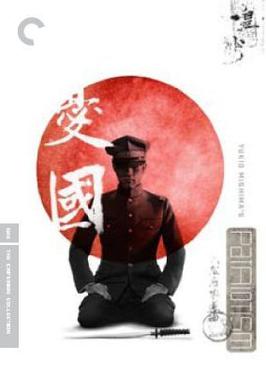
Patriotism or the Rite of Love and Death is a 1966 Japanese short film directed by Yukio Mishima. It is based on Mishima's short story "Patriotism", published in 1960.
Yuya Sato is a Japanese novelist from Hokkaido Prefecture. He won the 21st Mephisto Prize for Flicker Style, and the 20th Yukio Mishima Prize for 1000 Novels and Backbeard. His works have been translated into English, Chinese and Korean. Sato's short story "Same As Always" was translated for the The Penguin Book of Japanese Short Stories (2018), and has been described as "an acerbic meditation on the complex interplay of gender and nurturing in post-Fukushima Japan."
"Patriotism" is a short story by Japanese writer Yukio Mishima. It was first published in the January 1961 winter issue of Shōsetsu Chūōkōron (小説中央公論), which was published by Chūōkōron-sha in December 1960.
The bibliography of Kimitake Hiraoka, pen name Yukio Mishima, includes novels, novellas, short stories and literary essays, as well as plays that were written not only in a contemporary-style, but also in the style of classical Japanese theatre, particularly in the genres of noh and kabuki. However, although Mishima took themes, titles and characters from the noh canon, he included his own twists and modern settings, such as hospitals and ballrooms, which startled audiences who were accustomed to the long-settled originals.

Tokyo Stories: A Literary Stroll is an anthology of Japanese short stories set in Tokyo. The translator and editor Lawrence Rogers won the Japan-U.S. Friendship Commission Prizes for the Translation of Japanese Literature from the Donald Keene Center of Japanese culture in 2004. The stories are ordered by the areas of Tokyo in which they take place.

The Frolic of the Beasts is a 1961 novel by Yukio Mishima. It is considered a minor work from Mishima's middle period. Drawing inspiration from Noh plays, specifically the 14th-century Motomezuka, the novel centers on a tragic love triangle depraved by adultery and violence. It is a short novel in length and has a nonlinear narrative structure. The novel was first serialised thirteen times in the weekly magazine Shukan Shincho between 12 June 1961 and 4 September 1961. It was published in hardcover format by Shinchosha on 30 September 1961. It was published in paperback by Shincho Bunko on 10 July 1966. The novel was translated into Italian by Lydia Origlia and published by Feltrinelli in September 1983. The novel was translated into English by Andrew Clare and published in paperback format in the United States and Canada by Vintage International on 27 November 2018. Clare's translation was later published in paperback in the United Kingdom by Penguin Modern Classics on 4 April 2019. The English translation was re-released in the United Kingdom on 2 November 2023 as part of Penguin's Japanese Classics series.
"Star" is a short story by Yukio Mishima. It was originally published in the November 1960 issue of Gunzo, a literary magazine published by Kodansha. It was later included alongside "Patriotism" and "Hyakuman'en senbei" in the short story collection of the same name, Sutā (スタア), which was published on 30 January 1961 by Shinchosha.
The Guest at the Fest of Bon is a short story by Victor Pelevin, published in 2003.
Patriotism is the feeling of love, devotion, and sense of attachment to a homeland and alliance with other citizens who share the same sentiment.
Death in Midsummer is a short story by Japanese writer Yukio Mishima first published in October 1952.
Island of Death may refer to:







